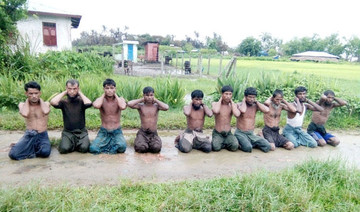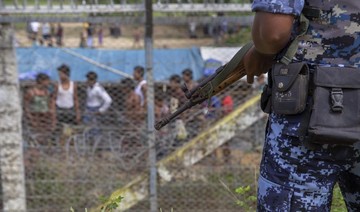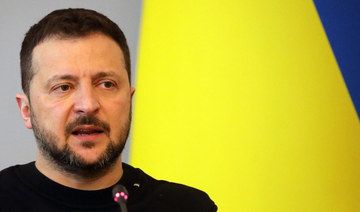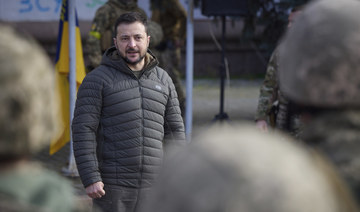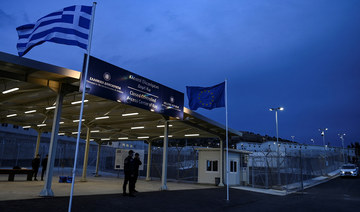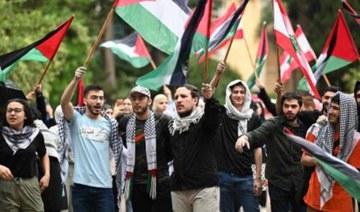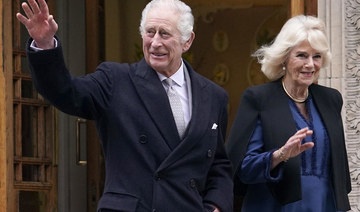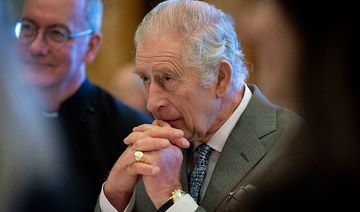COX’S BAZAR, Bangladesh: In hotels and restaurants near the beach at Cox’s Bazar in southeast Bangladesh, international and local aid workers sent to help the Rohingya in the world’s largest refugee settlement talk nervously of the major challenge ahead — the weather.
Cox’s Bazar was mainly known as Bangladesh’s top local tourism spot, famed for the world’s longest natural sea beach, until the 2017 arrival of more than 730,000 Rohingya fleeing persecution in Myanmar in a human exodus of unprecedented scale.
Joining thousands of Rohingya Muslims already in Cox’s Bazar, they cleared forests and built shelters from mud and bamboo to create a sprawling mass of camps that now house more than 900,000 people, of which 80 percent are women and children.
Over 18 months the Bangladesh government, with thousands of staff from about 145 non-government organizations (NGOs) and aid agencies, have brought order to the chaos, building more stable shelters, roads, sanitation and setting up community projects.
But while life in the settlement has started to stabilize, aid workers said they were rushing to secure the camps for the longer term with no sign of the crisis ending and one factor hanging over them — the monsoon in May then cyclone season.
“This is not an easy place to work because we are constantly worrying about things over which we have no control,” said Nayana Bose, spokeswoman for the Inter Sector Coordination Group (ISCG) that coordinates the humanitarian agencies’ work.
“It’s challenging in terms of terrain, weather, and population,” she said, adding this made it harder than other refugee crises and Bangladesh’s biggest ever humanitarian task.
Aid workers recalled how the early months of the crisis were focused on life-saving work, such as building shelters and latrines, food supplies, and dealing with health emergencies.
They worked around the clock in the camps located about 40 km (25 miles) south of Cox’s Bazar – a 1.5 hour drive that can take much longer depending on traffic on the pot-holed roads where aid agencies’ four-wheel drives vie with auto rickshaws.
Fly in, fly out
Most international staff came for three month stints but as time went on were replaced by staff on six month and one year contracts, working eight week shifts before flying out for one week of rest and recreation and to visit their families.
Leisure activities are limited in Cox’s Bazar, with alcohol in Muslim Bangladesh only available at some international hotels, so some aid staff set up yoga classes and book clubs.
Women must be dressed conservatively so swimming is not an option, although some aid workers value beach walks, and international workers are told not to leave hotels after 10 pm.
Firas Al-Khateeb, a spokesman for the UN’s refugee agency UNHCR, said he had worked with refugees in five other countries but the Rohingya crisis was more challenging.
First there was the sheer numbers involved, then language problems as most Rohingya are illiterate, complicating awareness campaigns about risks in the camps, and also the fact the Rohingya are not recognized by Myanmar and have nowhere to go.
Chances of the crisis ending soon are remote. Bangladesh’s government has vowed not to repatriate anyone unwillingly, garnering global praise for Prime Minister Sheikh Hasina who just won a third term despite reports of poll irregularities.
UN special rapporteur on human rights in Myanmar, Yanghee Lee, said on Jan. 25 it was clear the Rohingya cannot return “in the near future” with the situation unchanged and Myanmar still denying all accusations of persecution.
“The Rohingya are stateless and had been suffering back home. Some talk about the freedom they have here,” said Al-Khateeb, whose organization is frequently quoted saying the average length of stay in a refugee camp is around 15-20 years.
Getting ready
But he added that the weather was a major problem, with efforts now underway to make the camps as secure as possible in case of a severe monsoon or cyclone season. Last year the Cox’s Bazar area was not badly hit.
Anjum Nahed Chowdhury, a project manager with Christian Aid working on disaster risk reduction with BRAC, Bangladesh’s largest NGO, is focused on strengthening bamboo for shelters, digging ditches, landslide protection, and building brick roads.
“We must be ready for the monsoon season and we are much better prepared this year. If the cyclones had been bad last year it would have been a disaster,” she said.
While life in the camps is becoming normalized, the Rohingya are not allowed to formally work as this could impact local jobs, but they can earn about $5 a day on NGO projects in camps.
With this they can trade with each other at stalls that line the main roads winding through the camps that sell food, plastic toys and clothes as stray dogs and cows wander past.
Gemma Snowdon, a spokeswoman for the World Food Programme, said food in the camps was also changing to a longer-term plan.
At first they handed out rice, lentils and oil but now they are supplying people with cards with monthly amounts based on family size with which they can buy fresh food, dried fish and eggs from stores set up by local retailers in the camps.
Another program, run by the UN’s Food and Agricultural Organization (FAO), International Organization for Migrants (IOM) and WFP, is supplying all households with stoves and a monthly canister of LPG to reduce pollution and deforestation.
The loss of forest has been a key source of tension with some local people, who are now outnumbered two to one by the Rohingya, and lost some traditional income from the forest.
While other locals, like Theotonius Gomes who runs the Mag Darin restaurant, have welcomed the influx of aid workers which has boosted businesses and prompted the government to start work on an international airport terminal and extended runway.
But all the aid work comes at a cost.
Last year UN agencies and NGOs launched a $950.8 million appeal to provide essential humanitarian assistance, including to nearly 400,000 Bangladeshis in nearby communities, some of whom are as poor as the Rohingya, in a bid to diffuse tensions.
A new funding plan will be launched later this month, with initial drafts of the proposal, seen by the Thomson Reuters Foundation, showing the target will be about $920 million.
Aid groups are well aware raising funds could get harder as the crisis rolls on and new emergencies hit the headlines.
“But this emergency is not over yet. Still the Rohingyas need our help and support,” said Al-Khateeb.
Aid workers race to batten down Rohingya refugee camp with no sign of crisis ending
Aid workers race to batten down Rohingya refugee camp with no sign of crisis ending
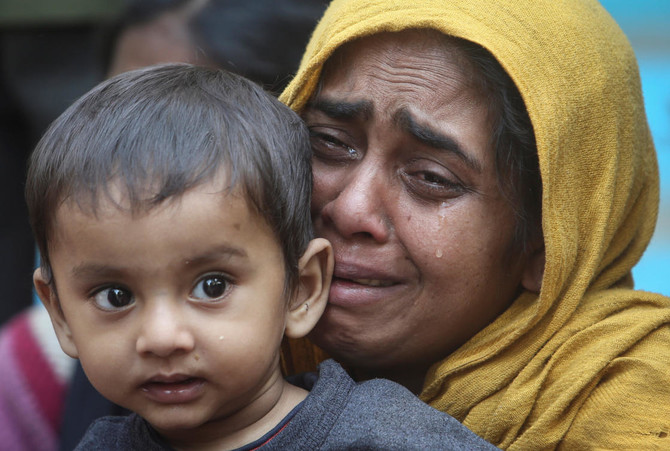
- Over 18 months the Bangladesh government, with thousands of staff from about 145 non-government organizations (NGOs) and aid agencies, have brought order to the chaos
- Aid workers recalled how the early months of the crisis were focused on life-saving work, such as building shelters and latrines, food supplies, and dealing with health emergencies
Forest fires raze parts of India amid heat, dry weather
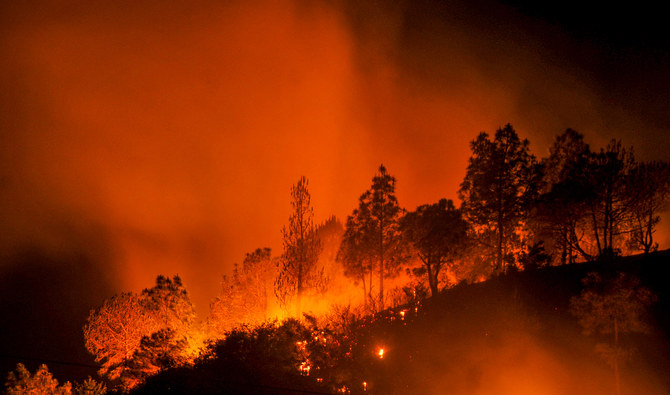
- As of 2021, 54.4 percent of forests in India experienced occasional fires, most of them due to man-made factors
- These fires have picked up again this year, with 653 incidents in Uttarakhand alone, government data shows
NEW DELHI: Frequent fires are razing forests in India’s Uttarakhand state in the north and Odisha in the east amid high temperatures and long dry spells, and the blazes have been worsened by people burning the forest to collect a flower used to brew alcohol.
Data from the state-run Forest Survey of India shows that as of 2021, 54.4 percent of forests in India experienced occasional fires, most of them due to man-made factors.
“Agriculture stubble burning, misconceptions and burning of shrubs to shoo away wildlife are major reasons behind the forest fires,” Swapnil Aniruddh, a forest official in Uttarakhand, told Reuters.
After a brief respite during the previous season from November to April, forest fires have picked up again this year, with 653 incidents in Uttarakhand alone, government data shows.
Odisha’s fires have been exacerbated by people setting parts of the forest ablaze to collect Mahua flowers, which are highly sought after as they are used to brew a popular liquor.
During the current season, 10,163 fire points in Uttarakhand have been detected using the government’s imaging radiometer.
Overall, loss of significant forest cover is a big worry for India as it tries to dramatically reduce its climate-changing emissions.
Among the organizations helping to curb the fires is the Indian Air Force, which has used the aerial firefighting ‘Bambi Bucket’ technique of collecting water from a nearby lake to spray over the region.
The situation may get worse, with India’s weather department predicting more heat-wave days than normal between April and June this year, along with a longer dry spell for Uttarakhand.
Pentagon chief pushes for donation of more Patriot systems to Kyiv
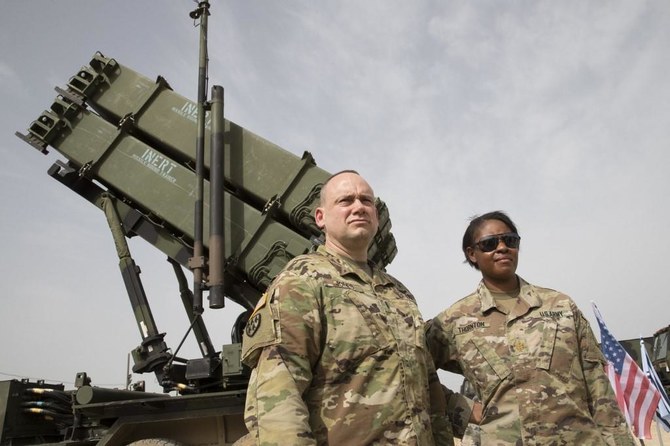
- “There are countries that have Patriots, and so what we’re doing is continuing to engage those countries,” Austin told a House Armed Services Committee hearing
WASHINGTON: US Defense Secretary Lloyd Austin said Tuesday he has been encouraging countries with Patriot missile systems to donate them to Ukraine, which has appealed for more of the air defense batteries.
“There are countries that have Patriots, and so what we’re doing is continuing to engage those countries,” Austin told a House Armed Services Committee hearing.
“I have talked to the leaders of several countries... myself here in the last two weeks, encouraging them to give up more capability or provide more capability,” he said, without identifying the countries by name.
Various European Union countries possess the systems, including Spain, Greece, Germany, the Netherlands, Poland and Sweden.
Ukrainian President Volodymyr Zelensky told NATO members earlier this month that his country needed a minimum of seven additional Patriot or other high-end air defense systems to counter Russian air strikes, urging them to step up their military assistance for Kyiv.
Greek court drops criminal charges against 35 international aid workers
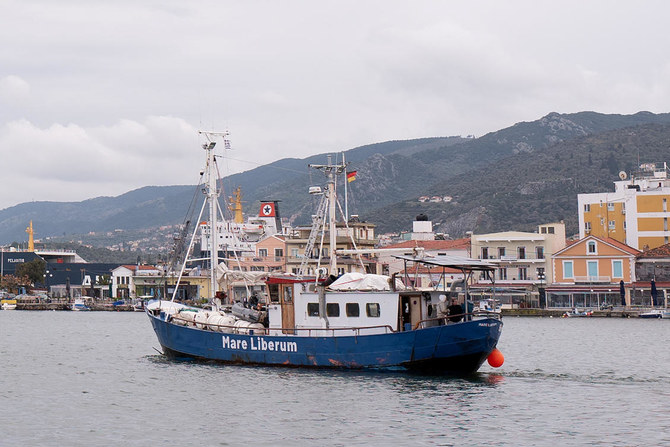
- The case was dropped due to inadequate evidence
- Greece was on the front line of a huge surge of refugees and migrants to Europe in 2015 and 2016
ATHENS: Greece has dropped criminal charges against dozens of international aid workers, ranging from spying to facilitating what authorities had called illegal entry into the country through the island of Lesbos, court documents showed on Tuesday.
Most of the 35 people, accused in 2020 of setting up a criminal organization and providing support to traffickers ferrying migrants, were German nationals. The rest included people from Norway, Austria, France, Spain, Switzerland and Bulgaria. They were arrested and had denied wrongdoing at the time.
The case was dropped due to inadequate evidence, the documents seen by Reuters showed.
“The detailed investigation of the case file has resoundingly quashed the police narrative which was pure fiction,” said Zaharias Kesses, a lawyer representing some of the aid workers.
Greece was on the front line of a huge surge of refugees and migrants to Europe in 2015 and 2016, many through its outlying islands close to Turkiye, including Lesbos. That flow has since ebbed.
The case was based on a 2020 operation by the Greek intelligence service EYP and the anti-terrorism unit with the code name Alkmini, and involved undercover agents who traveled as migrants from Turkiye to Lesbos.
Greek intelligence services were initially involved because the workers, who were using an alarm phone for migrants and asylum seekers in need of rescue at sea, were thought to have passed on information on Greek coast guard movements and vessel equipment.
But a magistrate’s investigation concluded the information and visual material collected were not confidential.
“There is not enough evidence to support the accusations against the defendants,” the documents said.
Top French university loses funding over pro-Palestinian protests
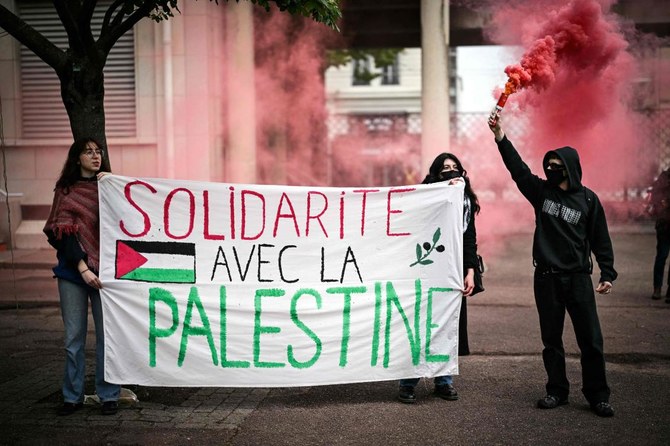
- Regional support for the Paris-based university includes 1 million euros earmarked for 2024
- The university’s acting administrator, Jean Basseres, said he regretted the decision
PARIS: The Paris region authority sparked controversy Tuesday by temporarily suspending funding for Sciences Po, one of the country’s most prestigious universities, after it was rocked by tense pro-Palestinian demonstrations.
“I have decided to suspend all regional funding for Sciences Po until calm and security have been restored at the school,” Valerie Pecresse, the right-wing head of the greater Paris Ile-de-France region, said on social media on Monday.
She took aim at “a minority of radicalized people calling for anti-Semitic hatred” and accused hard-left politicians of seeking to exploit the tensions.
Regional support for the Paris-based university includes 1 million euros earmarked for 2024, a member of Pecresse’s team told AFP.
On Tuesday, the university’s acting administrator, Jean Basseres, said he regretted the decision.
“The Ile-de-France region is an essential partner of Sciences Po, and I wish to maintain dialogue on the position expressed by Mrs.Pecresse,” he told French daily Le Monde in an interview published Tuesday.
In an echo of tense demonstrations rocking many top US universities, students at Sciences Po have staged a number of protests, with some students furious over the Israel-Hamas war and ensuing humanitarian crisis in the besieged Palestinian territory of Gaza.
France is home to the world’s largest Jewish population after Israel and the United States, as well as Europe’s biggest Muslim community.
University officials called in police to clear a protest last week. On Monday, police broke up a student protest demanding an end to Israel’s bombardment of Gaza at Sorbonne, another top French university.
Higher Education Minister Sylvie Retailleau said on Tuesday the French government had no plans to suspend funding for Sciences Po.
Speaking to broadcaster France 2, she estimated the state’s funding for the university at 75 million euros. She said there had been “no anti-Semitic remarks” and no violence had been committed during the demonstrations.
Both Basseres and Retailleau also said there were no plans to suspend Sciences Po’s collaboration with universities in Israel.
Critics on the left have denounced Pecresse’s announcement.
“It’s shameful and an absolute scandal,” said Mathilde Panot, the head of hard-left France Unbowed (LFI) deputies in parliament, adding the behavior of the students was a “credit to the world and a credit to our country.”
Panot and Rima Hassan, a Franco-Palestinian activist who is running on the LFI list for European elections, were on Tuesday questioned in an investigation into suspected justification of “terrorism” over comments on the October 7 attack by Hamas on Israel.
Several hundred people staged a solidarity rally in support of the two women on Tuesday morning.
“In what democracy are counter-terrorism methods used against political activists, community activists and trade unionists?” Panot, 35, told her supporters, who chanted “Resistance” and waved Palestinian flags.
“I want to tell the pro-Israeli lobby organizations behind these complaints that they will not silence us,” added 32-year-old Hassan.
The war started after Hamas’s October 7 attack on southern Israel resulted in the deaths of 1,170 people, mostly civilians, according to an AFP tally of Israeli official figures.
Israel’s retaliatory offensive has killed at least 34,535 people in Gaza, mostly women and children, according to the health ministry in the Hamas-run territory.
Palestinian militants also took some 250 hostages on October 7. Israel estimates 129 remain in Gaza, including 34 believed to be dead.
King Charles III resumes public duties as he fights cancer
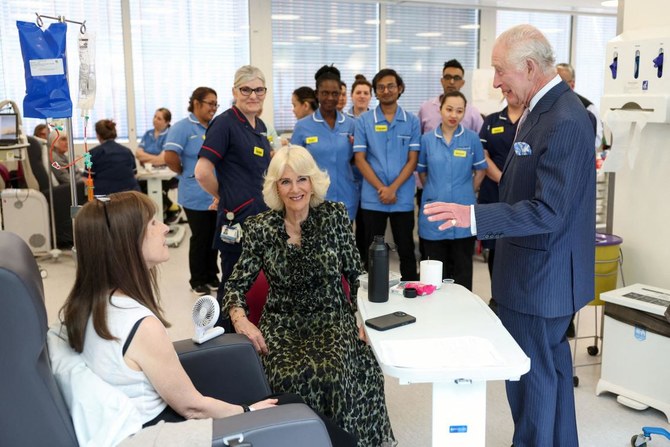
- The British head of state appeared relaxed as he and his wife Queen Camilla met patients and staff at the University College Hospital Macmillan Cancer Center
- He talked to patients receiving chemotherapy at a day unit
LONDON: King Charles III on Tuesday reportedly told fellow cancer patients “I’m well,” as he carried out his first official public engagement since being diagnosed with the condition.
The British head of state appeared relaxed as he and his wife Queen Camilla met patients and staff at the University College Hospital Macmillan Cancer Center in central London.
He talked to patients receiving chemotherapy at a day unit, including 60-year-old Asha Millen, who has bone marrow cancer.
“I said, ‘How are you?’ and he said, ‘I’m well’,” she told reporters afterwards.
Another patient, Lesley Woodbridge, 63, said the king sympathized with her, and added: “I’ve got to have my treatment this afternoon as well.”
Charles, 75, suspended most of his duties in February after cancer was found while he was being treated for an enlarged prostate the previous month.
The exact nature of his cancer has not been disclosed but doctors said last week they were “very encouraged” by the progress of his treatment as an out-patient and “positive” about his recovery.
His daughter-in-law Catherine, Princess of Wales, 42, underwent abdominal surgery in January and said in March that she was receiving chemotherapy.
Again, no details were given about what type of cancer she has. Kate, as she is widely known, is married to Charles’s elder son and heir Prince William.
Tuesday’s event was the first in a number of planned engagements in the coming weeks and designed to raise awareness of the importance of early cancer diagnosis and highlight innovative research, Buckingham Palace said.
Charles, who succeeded his mother Queen Elizabeth II in September 2022, was officially crowned king on May 6 last year.
He has been seen attending church services since his diagnosis and at selected audiences. He has also continued his official state business.
His treatment will continue but his schedule in the coming weeks will be reduced and subject to medical advice, a spokesperson added.
His engagements will include a state visit by Emperor Naruhito and Empress Masako of Japan in June.
The chief executive of University College London Hospitals group, David Probert, said Charles “deliberately went out of his way to meet as many staff and patients as he could.”
Patients were “delighted” to see him, he told Sky News, and described the visit as “incredibly uplifting.”
Members of the public last week welcomed the king’s return to some duties, praising him for raising awareness about cancer, which will affect one in two people, according to Cancer Research UK.
Probert said the king’s announcement had led to a surge in people looking up symptoms and seeking out treatment.
“It’s a huge issue in today’s society,” Keegan Gray, 23, a demolitions manager from New Zealand, told AFP on Friday.
“A lot of people have cancer and a lot of people they keep it to themselves, they’re a bit shy about it,” he added after the news Charles would resume some public duties.
Gray said it was “really beautiful” that the king was raising awareness of cancer and the work of treatment clinics.
Charles and Kate’s cancer diagnoses have created a headache for the royal family, with both having postponed public engagements.
William has also taken a step back to support his wife and their three young children, leaving fewer senior royals to fill the schedule.
Camilla, 76, has stepped in to take over many of her husband’s engagements. Charles’s sister Princess Anne and his youngest brother Prince Edward have also taken on more prominent roles.
Charles’s largely estranged younger son, Prince Harry, is no longer a working royal but is expected in London on May 8 to mark the 10th anniversary of his Invictus Games for disabled military veterans.
He will then join his American wife Meghan on a visit to Nigeria.


